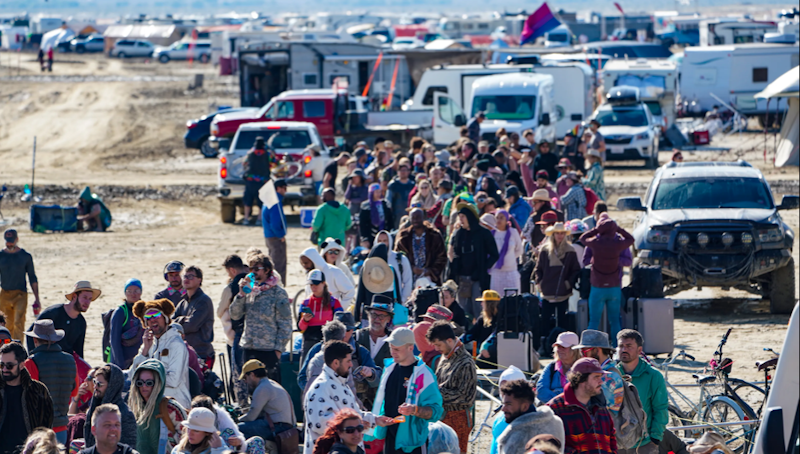It was a bad omen for this year's ill-fated Burning Man festival that some "Burners" were reported to be among the climate-change protesters blocking the road into the Nevada desert where all the communal fun was to take place. One of their signs read "Burners of the World Unite," but it's hard to get many Burners to "unite" in forming "Eiffel Towers" (look it up) in the "Orgy Dome"—an air-conditioned sex retreat in which the event's creators claim that 5000 attendees got it on last year—when potential orgiasts, blocked by their fellow festival goers, have to hike miles through the desert to join the romp.
My Splice Today colleague, Emina Melonic, who'd never heard of the event before this year's highly-publicized, rain-flooded fiasco, gave me an impressive instant analysis of it on Twitter—"pagan collectivism"— right after learning about it. The "paganism" part still burns bright, but the "collectivism" aspect is sagging under the weight of all the cash that's thrown around on the grounds. The result's a two-tiered affair consisting of the old-timer, hippie element and the tech-world day-trippers looking for hedonistic kicks without paying the freight in sweat equity.
Why get down in the trenches and pitch in for the greater good when you can pay someone to set up your camp, cook, and clean for you? This dichotomy of privilege is hardly a shock. History has shown repeatedly that collectivism is bound to produce an elite class with a separate set of rules. It wasn't the proletariat in the USSR who had dachas outside of Moscow.
The stoners at Burning Man are drawn to the pagan elements because they're among the millions in Western nations who've rejected conventional religion for decades. To fill the spiritual void, they've turned to individualistic self-expression: "Whatever feels good, do it." Pleasing a deity's gone out of fashion; pleasing oneself is where it's at.
It's ironic that the force that paganism worships—Mother Nature—turned on the pagans this year. Perhaps she'd finally had enough of the deviation from Burning Man's core principles since co-founders Larry Harvey and Jerry James burned a wooden figure on San Francisco's Baker beach in 1986 to commemorate the summer solstice. Although "decommodification" is one of the 10 original guidelines of Burning Man, DJ Diplo (the music mogul who reportedly fled this year's festival with Chris Rock by trudging through six miles of mud) used the festival in 2019 to promote Popeye's chicken sandwiches. "Wendy's, your move," was the message he left on social media. Other celebrity moves have been less explicable, as when Susan Sarandon showed up in 2015 and drank, in a display of hippie-dippy paganism, a beverage containing the ashes of Timothy Leary.
To her credit, though, the actress doesn't appear to be one of the dilettante celebrity poseurs using Burning Man to burnish their image by attending a "cool" event. According to news reports, she arrives early and gets her hands dirty. But this hands-on approach isn't for the many involved in commercial photo shoots, product placements, and all the Instagram postings. Fashion models and social media influencers shun group activities in favor of wearing brands and tagging them on Instagram.
The long-term Burners, grounded in the communal ethos emerging from the Baker Beach scene, aren’t thrilled with rich techie dilettantes like Sergey Brin, Eric Schmidt, Jeff Bezos, Elon Musk, and Mark Zuckerberg, who've all dropped into the "anti-capitalism" event. Zuckerberg helicoptered in for a day to serve grilled cheese sandwiches—his low-budget billionaire way of honoring the Burning Man "gifting" principle, a pie-in-the-sky idea involving gift-giving without expectation of reciprocation. The Meta chief even, according to breathless Business Insider reporting, helped pitch his own tent.
But the veteran Burners who arrive early in the desert with plywood and carpentry tools to put the temporary town called Black Rock City together aren't impressed by the showy elite who head straight for the turnkey camps with luxury amenities like cleaning staffs and private chefs. They're cheaters arriving in private jets that leave a heavy carbon footprint. Capitalism beats utopianism any day of the week.
Burning Man's ostensible rejection of capitalism is threadbare at this point. The temporary counter-culture hedonists joining the "utopian" community for a week are using the fruits of capitalism to pay the average entry fee of $725, and that excludes camp fees, which can run into the thousands of dollars. And then there's supplies and, of course, the drugs.
Surveys have shown that the average salary of Burners has spiked significantly since 2006. The "radical inclusion" that's at the top of the list of the 10 guiding principles of Burning Man would only be radical if the entry fees were based on a sliding scale tied to income.
How does a counterculture festival within driving distance of Silicon Valley remain true to itself over the years? The same way a counterculture city—San Francisco—does. It doesn't.

